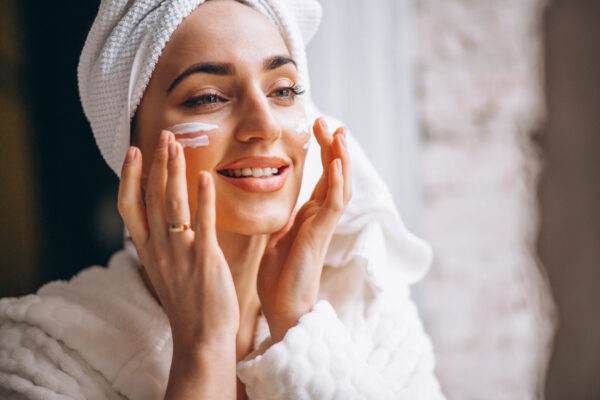
When protecting your skin from the sun, the terms “sunscreen” and “sunblock” often pop up, but do they mean the same thing? While both are essential types of sun protection, understanding the difference between sunscreen and sunblock can help you make an informed choice. We believe in providing our clients with the knowledge to make the best skincare decisions, so here’s a detailed guide on how these products differ, their unique benefits, and tips on choosing the right one for your skin type.
What is Sunscreen?
Sunscreen absorbs UV rays, preventing them from penetrating the skin. It usually contains ingredients like oxybenzone and avobenzone, designed to filter UV radiation, making it ideal for daily wear. Sunscreen is often lightweight, sheer, and easy to blend, offering a more natural look. For those interested in maintaining skin health without heavy coverage, sunscreen is an excellent choice to incorporate into your daily skincare routine.
Sunscreen primarily protects against UVA rays, which cause premature ageing and pigmentation issues. It’s recommended for those who spend moderate time outdoors and want a more cosmetically elegant product. Different types of sunscreen are available, including formulas designed for oily, dry, or sensitive skin. Choosing a sunscreen based on your skin type can maximise its benefits.

What is Sunblock?
Conversely, Sunblock offers a physical barrier that reflects UV rays away from the skin. It uses minerals like zinc oxide and titanium dioxide on the skin’s surface to block both UVA and UVB rays. This makes sunblock ideal for individuals with sensitive skin or those who plan to spend extended time in direct sunlight, as it provides a more robust shield.
Due to its thicker consistency, sunblock is noticeable on the skin, often leaving a slight white cast. However, its effectiveness is unmatched for outdoor activities and water resistance, making it a top choice for beach days or sports. Sunblock’s formula stays intact for longer under heat and sweat, providing consistent protection without frequent reapplications.
Key Difference Between Sunscreen and Sunblock
Understanding the difference between sunscreen and sunblock is key to making the right choice for your skin type and daily activities. The primary distinction lies in how each product shields the skin from UV radiation:
Sunscreen acts as a chemical filter. It penetrates the skin’s outer layers and absorbs UV radiation, converting it into heat and releasing it from the skin. This type of protection is often referred to as a “chemical barrier” and is generally lightweight, making it a preferred option for everyday use. Sunscreens focus on blocking UVA rays (which lead to premature ageing) and often have a smoother texture, ideal for layering under makeup.
Sunblock, on the other hand, creates a physical barrier on top of the skin. It typically contains mineral ingredients like zinc oxide or titanium dioxide, which physically reflect UV rays off the skin’s surface, blocking UVA and UVB rays. This makes sunblock especially effective for those with sensitive or sun-damaged skin and for prolonged sun exposure. Sunblock is often visible on the skin, making it a bit heavier and harder to blend, but it provides durable, all-around protection.
Another key factor to consider is water resistance. Both sunscreen and sunblock can come in water-resistant varieties, but sunblock often holds up better during prolonged exposure to water or sweat. This makes sunblock a more resilient choice for swimming, hiking, or any prolonged time under intense sunlight. If you’re unsure which product would work best for your lifestyle, our team at Bodycraft can provide personalized recommendations based on your skin type and daily routines.
Benefits of Sunscreen
-
- Lightweight and Sheer: Sunscreen blends easily into the skin without leaving a visible residue, perfect for daily wear under makeup or as a stand-alone product.
-
- Broad UVA Protection: Sunscreen’s focus on UVA protection helps reduce signs of ageing, such as wrinkles and fine lines, and prevents sunspots and pigmentation issues.
-
- Flexible Formulas: Sunscreens are available in various types, including gel, cream, and spray, catering to different skin types and preferences. Whether your skin is oily, dry, or sensitive, there’s a sunscreen that fits your needs.
-
- Enhanced Skincare Options: Many sunscreens include additional skincare benefits, such as moisturizing agents or antioxidants, which further nourish and protect the skin. Our Bodycraft products feature innovative sunscreens that combine sun protection with hydration.
Benefits of Sunblock
-
- Broad-Spectrum Protection: Sunblock offers extensive protection against UVA and UVB rays, reducing the risk of sunburns and long-term skin damage.
-
- Water-Resistant Durability: Sunblock’s formula is highly resilient, providing consistent protection for outdoor activities, water sports, or intense heat.
-
- Suitable for Sensitive Skin: Mineral-based sunblocks are gentle on sensitive or acne-prone skin, as they don’t contain irritants often found in chemical sunscreens.
-
- Immediate Protection: Unlike sunscreens, which must be applied about 20 minutes before sun exposure, sunblock offers instant protection, making it convenient for on-the-go applications.
Takeaway
In the debate of sunscreen vs sunblock, which is better, the answer depends on your skin’s needs, lifestyle, and sun exposure. Though they function differently, both products are essential in protecting the skin from UV damage. Sunscreen is perfect for daily, lightweight protection against ageing, while sunblock is ideal for intense outdoor exposure and sensitive skin.
When choosing between types of sun protection, consider factors like your skin type, sun exposure level, and preferred texture. Combining both products is a powerful way to ensure complete protection for optimal sun care. If you need further guidance, Bodycraft’s skincare specialists are here to help you make the best choice.
Book an appointment at Bodycraft today for a personalised skincare consultation, and let our experts recommend the ideal sun protection strategy and treatments to keep your skin healthy and radiant all year round.
